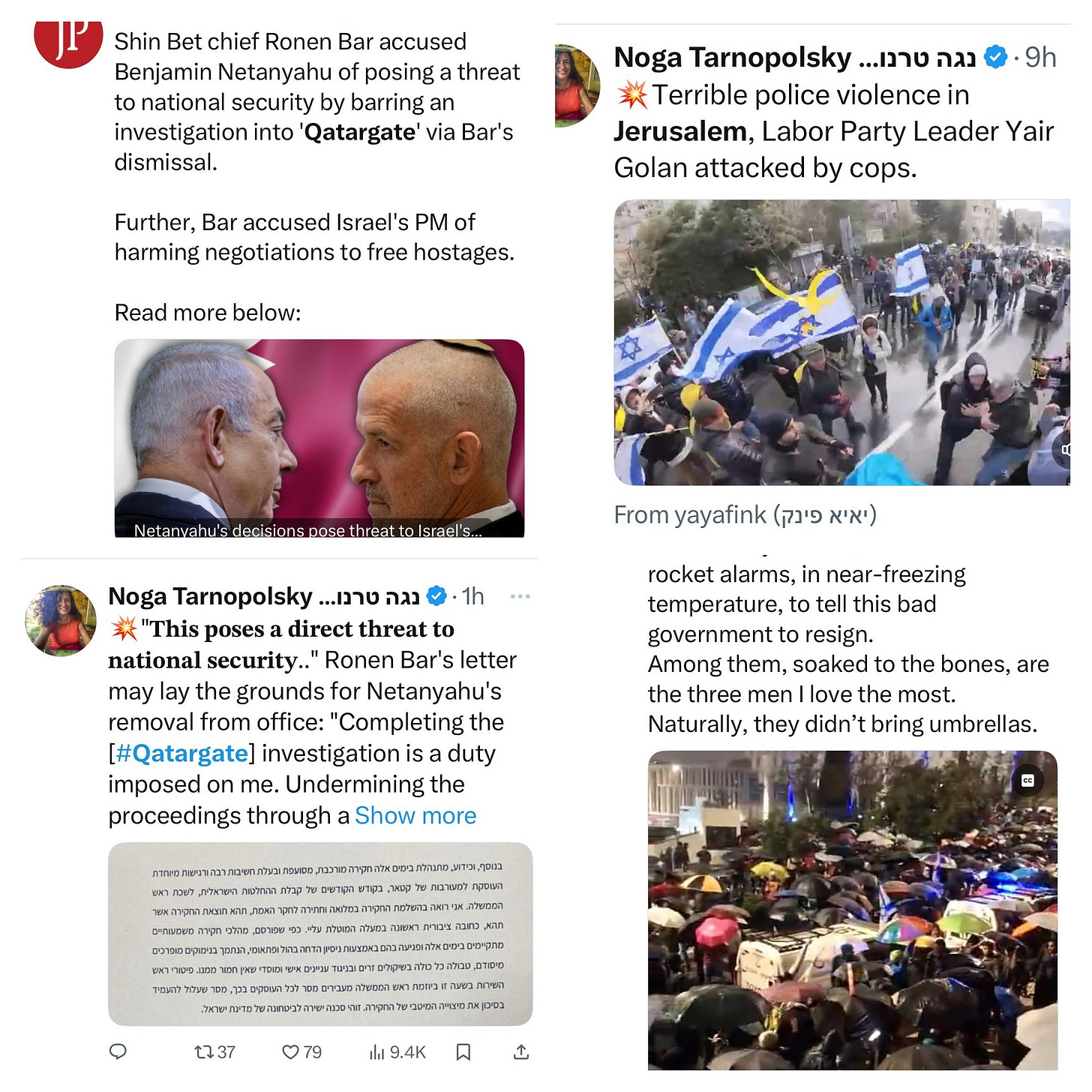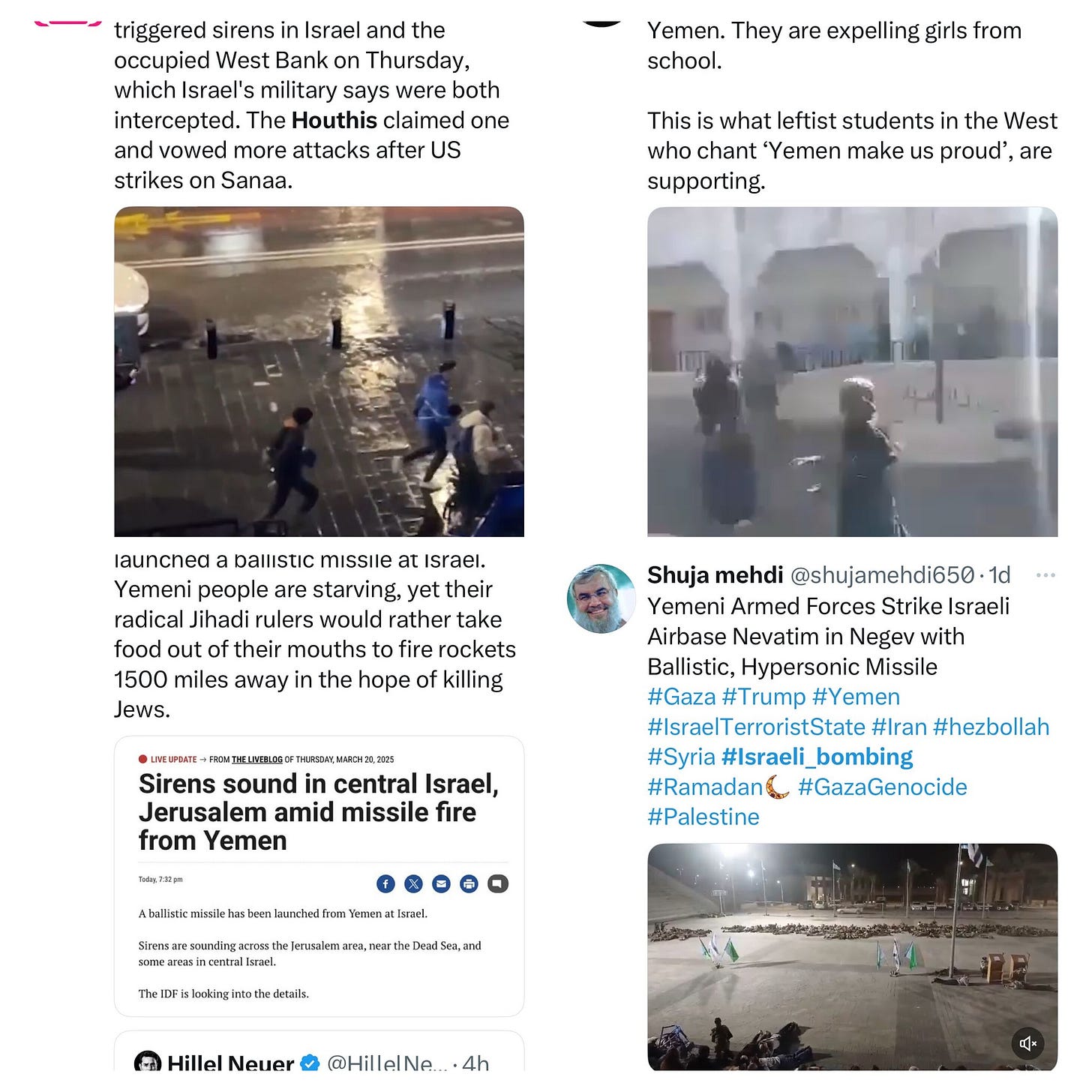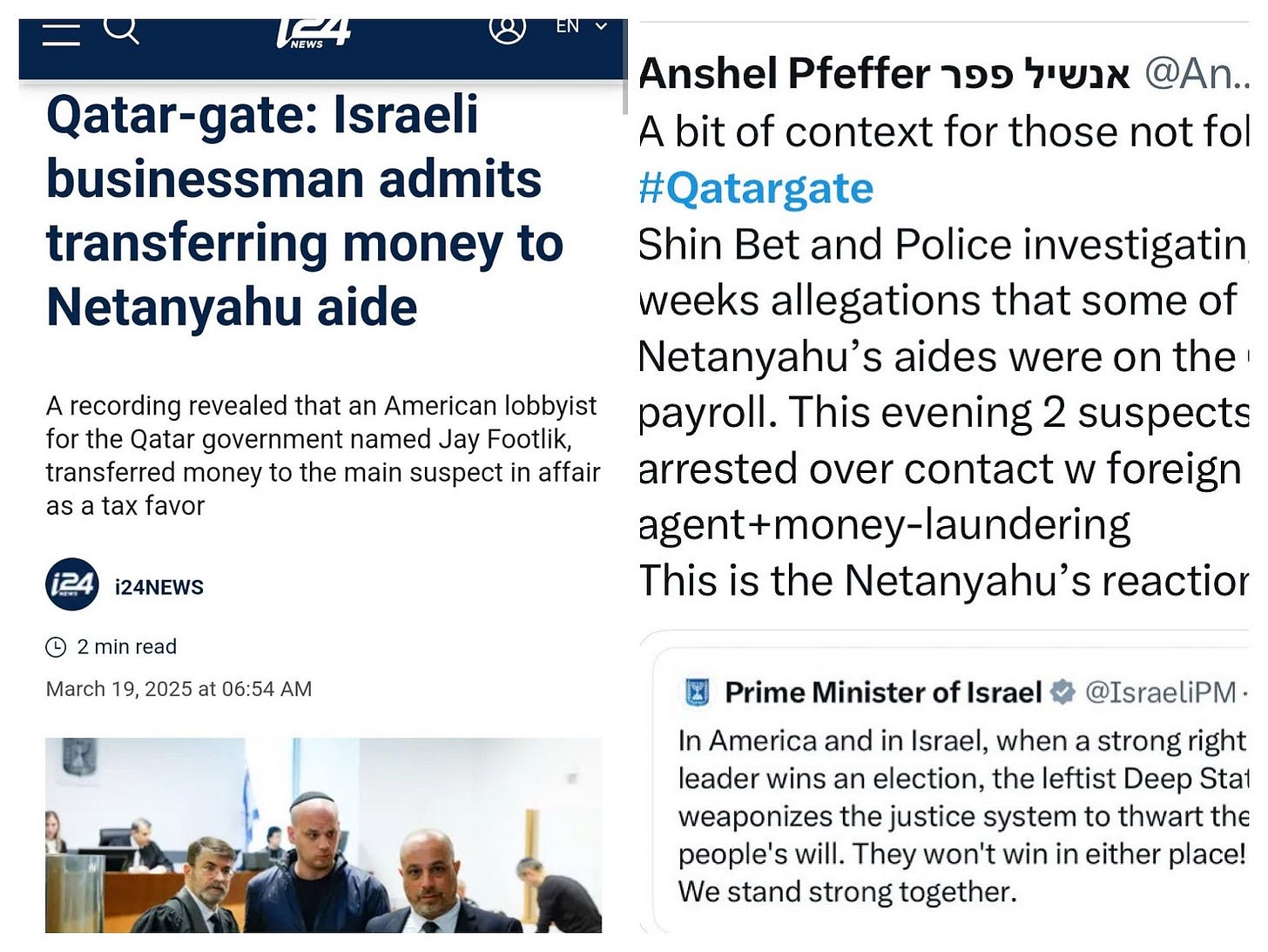Israel at War - Day 531
Gaza Ceasefire Ends
1. Israel Renews the War in Gaza, Hamas Retaliates
Earlier this week Israel surprised Gaza by launching an air strike early in the morning, targeting Hamas senior leaders. That was the sign that Israel had restarted the war in Gaza, after more than two months of ceasefire. The ceasefire was part of a hostage exchange agreement that enabled the return of 33 hostages - alive and dead, and the withdrawal of Israeli military forces from most areas in Gaza. This was the first phase of the agreement. In the second phase, the parties were scheduled to negotiate extending the ceasefire, releasing more hostages, with Israel evacuating its forces from the Philadelphi corridor which controls the border and passage between Egypt and the Gaza Strip. The third phase included ending the war and withdrawing all Israeli forces from Gaza. The second phase did not start. Israel's PM and the entire government refuse to end the war until there is a total victory which includes the elimination of Hamas. The price may be the lives of the 24 hostages still thought to be alive in Gaza, and 35 hostages who are dead. After launching the aerial strikes Israel also launched a ground operation re-occupying areas in Gaza, and ordering the population to evacuate and move south again.
Due to the return to military operations Israel declared a state of emergency in the south, schools were closed for the day, restrictions were imposed on people regarding public gatherings, and all trains were not running in the area.
An outcome of the military operation is the return of the Otsma Yehudit (Jewish Power) party to the government. This party, which is led by Itamar Ben-Gvir, resigned from the government when PM Netanyahu signed the hostage agreement, which they opposed. Ben Gvir announced that they would only rejoin the coalition if Israel restarted the war. He was sworn in as the minister of national security.
In return, Hamas launched a missile attack on the center of Israel on Thursday morning, causing tens of thousands of people to seek shelter in the middle of a workday.
It is important to add here that until now, more than 500 days into the war, the Israeli government still does not have a plan for the day after the war ends. PM Netanyahu refuses to even discuss the next chapter.
2. Government Votes Unanimously on Dismissal of Shin Bet Chief Ronen Bar
In a late-night meeting Thursday, the government voted for the dismissal of Ronen Bar, chief of Israels Central Security Service (Shin Bet). The dismissal will take effect by April 10th or when a replacement is appointed.
Earlier this week, PM Netanyahu informed Shin Bet security chief Ronen Bar of his decision to fire him, citing “ongoing lack of trust" as the cause behind this decision. The announcement sparked public criticism, as well as questions regarding the PM’s authority to pass such a decision in the cabinet. Israel's Attorney General Gali Baharav-Miara – who is facing threats of dismissal herself - told Netanyahu that his decision to fire Ronen Bar requires further legal examination, adding that “the role of Shin Bet director is not a position of personal trust serving the prime minister." Former senior Jurists, some who served on the supreme court and as Attorney Generals warned that the appointment of a Shin Bet chief based on considerations of personal loyalty is risky for Israeli democracy.
Bar, in response, published a long statement, stipulating that Netanyahu's demand for personal loyalty was "fundamentally flawed." Several analysts suggested that the decision to fire Shin Bet chief Bar was a result of two things: first, the on-going investigation of the Shin Bet and police of employees and advisors at the PM’s office and their connections to Qatar (Qatargate”), and second, a classified section in the Shin Bet investigation of the October 7th Hamas attack, which points to Netanyahu’s responsibility for continuing to allow Qatari funding of Hamas, despite repeated warnings from the Shin Bet.
The decision to fire Shin Bet chief Bar sparked public uproar. Thousands stood outside the PM’s office for hours in the pouring rain, as the government held a meeting to vote on the Shin Bet chief dismissal. Chief Bar himself refused to attend the meeting, and sent a letter instead, claiming his dismissal during an ongoing investigation is “a rushed process, contaminated by acute conflict of interest”.
3. U.S. Strikes Houthi Targets, the Houthis Retaliate
This week, the U.S. carried out several airstrikes in Hudaydah, a port city in Yemen, targeting – according to some Arab news outlets - a government compound. In a statement following the strikes, President Trump said that any further Houthi attacks or retaliation "will be met with great force." Local and international analysts commented that the U.S. strikes on Houthi targets were intended to put pressure on Iran. Indeed, in his statement, President Trump added that any shot fired by the Houthis would be considered "as being a shot fired from the weapons and leadership of IRAN," and that Iran would be held "responsible and suffer the consequences and those consequences will be dire!"
In retaliation, the Houthis launched two single missiles at Israel during the week. Sirens were heard around the country, both missiles were intercepted before they entered Israel’s territory, IDF sources reported.
4. QatarGate in Israel: New Details Are Revealed:
New details about the connections between Qatar and key advisors of PM Netanyahu were revealed by journalists last week.
QatarGate is a troubling story that strongly alleges that Qatar managed to get access to the closest circle of PM Netanyahu's confidants, and may have had access to classified materials. One of PM Netanyahu’s spokespersons, Eli Feldstein, was hired by the PM's office without receiving the needed classified security status. Therefore, the PM office could not hire him directly and they needed an outside financial path to pay his salary. A series of investigative journalists have revealed that Qatar was the source of money to pay his salary. An Israeli businessman admitted in a recorded interview that he was the one who transferred the money from a key Qatari advisor to Feldstein.
These revelations are in addition to what was revealed in the last few weeks, that PM Netanyahu's close advisors were allegedly recruited by Qatar to help the country improve its branding, and image, especially during the World Cup games which were held in Qatar. In a recorded video, PM Netanyahu accused the Shin Bet, which opened an investigation on the QatarGate story, of being a deep state. PM Netanyahu is running a campaign against all major state institutions.
It is important to say in this context that there is a sweeping gag order imposed on most of the details of this story.
5. Israeli Born Actress Gal Gadot Receives Star on Hollywood Walk of Fame
Gadot earned her fame for roles such as “Superwoman”, in the “Fast and Furious” series, and most recently, as the evil queen in the new rendition of “Snow-white”. Gadot has been, and more so since October 7th, 2023, an avid advocate for Israel. The ceremony earlier this week was accompanied by pro-Israel and pro-Palestine vocal protests. This is following the widely covered tensions between Gadot and Snow White co-star Rachel Zegler, over the war in Gaza.
Born in a small town in Israel, Gadot said after the ceremony: "I feel like I'm the luckiest woman I know right now," said Gadot, speaking at the ceremony. "I'm just a girl from a town in Israel, and I could never imagine such a moment. I never dreamt of becoming an actress”.










